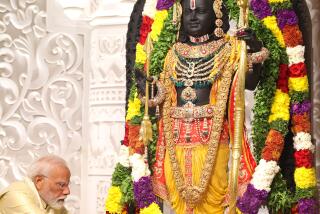Troubled Passage for India : Governments fall as religious conflicts rise--the challenge for Washington
- Share via
Japan hasn’t been the only major nation with a shaky foreign policy during the Gulf War. But Washington was too preoccupied to notice New Delhi’s diplomatic dithering. Nor is Iraq the only large country that has been riven lately by ethnic and religious tensions. India, the world’s largest democracy and second most populous nation, has been shaken by a surge of Hindu militancy that could just threaten to make Baghdad’s convulsions look not all that extraordinary. India has been enduring its worst riots and demonstrations since the partition of 1947.
At bottom the unrest is a product of the endemic religious conflict between India’s Hindus and Muslims (the country has almost as many Muslims as Pakistan); of the continuing Sikh insurgency, and of the Muslim separatist movement in Kashmir. This instability has unhinged the parliamentary system--which, with five major parties, was not exactly one long happy hour anyway--and reduced production, slowed foreign investment, raised prices and widened India’s budget gap.
In a little over a year, two successive governments have vaporized. The latest was the tenuous coalition stitched together by former Prime Minister Chandra Shekhar; it lasted all of 117 days. And recent attempts to rebuild the political house have floundered. So Parliament was dissolved and new elections ordered up. That might just set the stage for the return of Rajiv Gandhi, who fell from power in 1989.
The Indian election in May is likely to prove a political milestone in the nation’s history. At stake is a four-decade tradition of national union with strong secular and centrist institutions. Religious hostilities also plague India’s always-testy relationship with neighboring Pakistan. Because of the nuclear capability of both countries, Washington needs to maintain its continuing watch over the relationship between Pakistan and India.
It should also understand that it faces a probable future of consensus-seeking coalition governments there--hardly the easiest form of government with which to do business. Washington’s patience is sure to be sorely tried, but no matter which party or politician emerges, Washington must remember that maintaining India’s stability, secular tradition and union are proper goals of U.S. foreign policy--and prerequisites to peace in that subcontinent.
More to Read
Sign up for Essential California
The most important California stories and recommendations in your inbox every morning.
You may occasionally receive promotional content from the Los Angeles Times.













